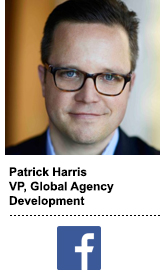
Agencies have a “can’t live with it, can’t live without it” relationship with Facebook.
The world’s second-largest ad platform, which reaches roughly 2.4 billion people, is a must-buy for brands. But a stream of issues around brand safety, misinformation and election integrity have made Facebook a precarious place for a brand to expose itself.
Facebook’s agency relationships are overseen by Patrick Harris, VP of global agency development, who joined the company eight years ago when it didn’t have a cohesive go-to-market strategy for agencies.
“It was like, there are these large holding companies, we don’t have people looking after them, but we know they’re really important,” he told AdExchanger.
Today, Facebook has 450 people in 50 countries focused on agency relationships. While the platform has worked closely with holding companies since 2011, it has recently expanded to cover creative agencies and management consulting firms and is beefing up its presence in local markets.
But as Facebook focuses on helping buyers get the most value out of its products, it’s navigating a changing political and regulatory landscape that impacts the way brands view the platform.
“We’re all navigating this new normal,” Harris said. “We have to own our responsibility and transparently communicate as much and as often as possible.”
He spoke with AdExchanger.
AdExchanger: How do you respond to agency concerns around data privacy and security on Facebook?
PATRICK HARRIS: We have to acknowledge when we’ve made mistakes. We have to transparently communicate what we’re doing to fix and honor the responsibility we have to our advertisers. We’re trying to get better at getting ahead of these things. We’re responding in time frames that make it easier for agencies to explain [what it means] to their clients.
The noise coming from Facebook has been loud, but these issues are things we and the industry need to [focus on]. We need to work with government bodies to make sure we’ve got policies that protect people but also allow businesses to thrive and people to communicate.
Agency CEOs have called for marketers to stop buying Facebook to hold the platform accountable. What’s your response when you see things like that?
We pick up the phone. We’ve got to engage. It’s our responsibility to understand where people are coming from, be available to answer questions and meet with their clients. We would prefer to have advocates versus adversaries, but it’s our job to make sure people feel confident enough to be our advocates.
Do they?
It depends on who you ask and in which country. It’s our responsibility to make sure they trust and believe in the decisions we’re making as a company.
We want clients and agencies to trust that we can be the No. 1 growth driver for their businesses. More importantly, we want them to trust the integrity of the people who are serving them and the company as well.
How has the way you worked with agencies evolved over the past eight years?
It used to be very clear who owned what. The big idea came from the creative agency. The fiduciary responsibility was maintained by the media agency. Now there’s such a blurred line. You have new entrants like digital specialist agencies and a whole host of creative Facebook Marketing Partners that didn’t exist five years ago. You’ve got the in-housing movement fueled by Fortune 500 brands where cost-cutting seems to be the norm.
On top of that you have the management consulting firms. Look at what they’re doing from an M&A perspective. If they’re helping a large automotive company rewire their supply chain, you can bolt on digital advertising to that.
How does Facebook work with consultants, who generally stay away from media buying?
We’ve always looked at our entrance into [client] organizations through the lens of the CMO. But there’s so much more to that as we get into enterprise opportunities. Workplace is a perfect example. If you’re a large company, are your employees using Slack or Yammer or Workplace? That’s a small example of how consulting firms can help us reach new clients where they have relationships with the CIO, CTO, CEO and board.
Fortune 500 companies [are trying to figure out]: How do I make my business more digital? How do I do things like online to offline? How do I do customer care in a world where more people are messaging on mobile? These are all solutions Facebook can help with that aren’t immediate advertising opportunities. But if we can be a valued partner for large organizations, consulting firms can help us get in there.
What are buyers asking for from Facebook these days? How is the buy changing?
Stories are huge. [Agencies] get the value. It’s more about doing it at the speed that meets consumer expectations. [They] are experimenting with the creative. It’s like mobile video three or four years ago. You can’t just put a six-second pre-roll in the News Feed and expect it to work. You can’t just put your mobile video in Stories and expect it to work.
We also launched a product that gives people the opportunity to buy in a way that’s very consistent with how they buy television. You get a fixed rate, guaranteed audience, all of the things you would find in an upfront. That’s around Watch.
Are brands buying Watch?
Advertisers are excited because it’s a brand safe environment. There’s a ton of review. We’re trying to figure out the ad pods, but giving predictably and control outside of the auction is a place where people are interested.
This interview has been edited and condensed.
This post was syndicated from Ad Exchanger.


More Stories
NZ Herald launches investigative podcast: Mr Asia
ADWEEK to Expand Marketing Vanguard Platform
Concentrate’s work with Chelsea Sugar recognised at HubSpot awards